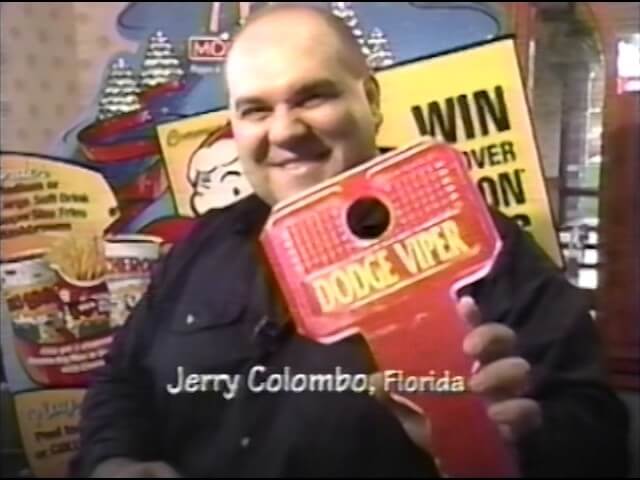All it takes to win McDonald's Monopoly is a massive, country-wide criminal conspiracy

It seemed too easy, didn’t it? That McDonald’s could put an instant win game piece for $1 million on a carton of French fries and expect whoever bought it to not unwittingly toss that shit in the trash. Regardless, the Monopoly game was one of McDonald’s best promotions; most people never expected to score the big-ticket game pieces—other instant wins included cars and 6-digit cash prizes—but all those free small sodas were worth the tear. Still, there was nevertheless a contingent that scooped up as many large fries and sodas as possible, collecting game pieces in the hopes of achieving one of those rare, rare prizes (the chances of scoring a $1 million ticket were 1 in 250 million). They were courting Lady Luck, but, as a fascinating new piece in The Daily Beast details, it appears the fair Lady’s hand was already taken.
Throughout the ‘80s and ‘90s, Jerome Jacobson, an ex-cop and the director of security for Simon Marketing, the company tasked with producing the McDonald’s game pieces, was running an elaborate scheme that found him hoarding the winning game pieces and funneling them through a number of different accomplices, all while skimming a bit off the top for himself.
Here’s an excerpt detailing the life of luxury Jacobson was able to build for himself by bilking the fast food-consuming public:
By the end of 1998, Jacobson had become Rich Uncle Pennybags, and America was his game board. He tooled around the United States stealing almost all the big-ticket game pieces, acquiring new properties on a whim, and collecting kickbacks from other players. Now he was hanging out with powerful Italians, he dressed in sharp suits and sometimes used the name “Geraldo Constantino.” He and his wife moved into a fine, red-brick home in Lawrenceville, Georgia, where he tended to its perfect lawn. He purchased a plot of land on Lake Hartwell, a recreation lake on the Georgia border, and paid for expensive cruises, and joined a classic car club. There, he sold one member four game pieces and used the $65,000 to buy a handsome Oldsmobile. Bill LaFoy, who lived opposite Jacobson, lost count of the new cars appearing on the driveway: “I used to kid him about where the winning tickets were,” he said.
If it all weren’t odd enough, Jacobson’s network was riddled with unsavory mobsters, drug runners, and psychics, not to mention plot twists that include familial disputes, revenge plots, and a bit of blackmail that Jacobson thought could exonerate him should everything fall apart. If this sounds like a story you feel you should’ve heard before, consider this: Jacobson’s plot unraveled around the same time as September 11th, 2001. America was preoccupied.
Jeff Maysh’s voluminous piece breaks down the origins of Jacobson’s grift, the investigation that brought it down, and the vast array of colorful characters that pass through this particular set of golden arches. Read the full story here, and blame Jerry Colombo—the guy holding the big key in the below video—for that Dodge Viper you didn’t win off a box of fries 20 years ago.